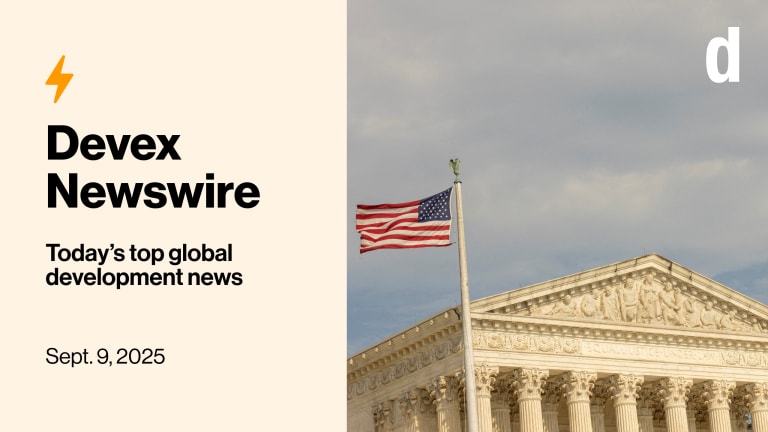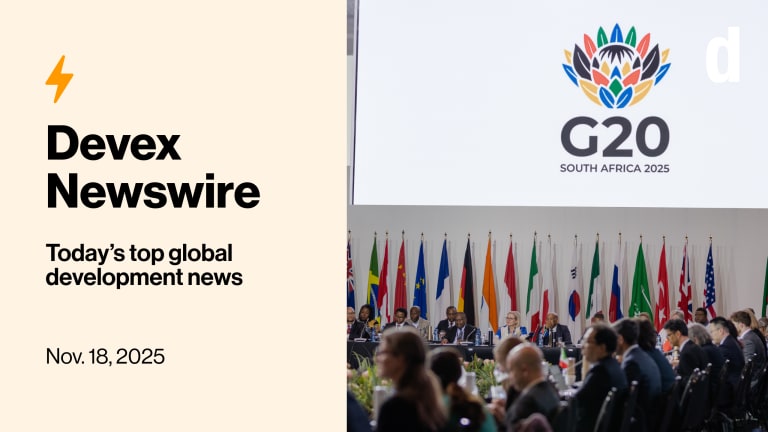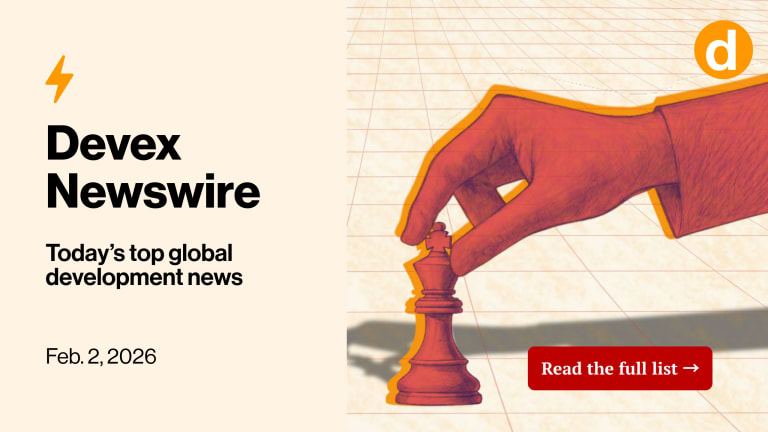
A lawsuit in the United States arguing that giving grants based on race is discriminatory could potentially impact U.S. and global philanthropy’s diversity, equity and inclusion, or DEI, efforts.
This is a preview of Newswire
Sign up to this newsletter for an inside look at the biggest stories in global development, in your inbox daily.
Also in today’s edition: Experts worry that the worsening food insecurity in the Horn of Africa isn’t getting the global attention it deserves, and there are hiccups in far-right Dutch politicians’ plans to cut foreign aid.
History in the making
The philanthropy world is closely following a case that could derail DEI programs, many of which were initiated or expanded after the global racial reckoning in 2020.
Last August, The American Alliance for Equal Rights, or AAER, a nonprofit organization run by conservative legal strategist Edward Blum, filed a lawsuit in the state of Georgia against Atlanta-based Fearless Fund venture capital firm and its foundation over a grant contest for Black women entrepreneurs. The contest excludes other groups and therefore violates a law enacted in the aftermath of the U.S. Civil War to prevent discrimination against African Americans, most of whom were newly emancipated from slavery, AAER contends.
A ruling against race-based grants could force funders to change their practices, impacting both domestic and international programs. Legal experts anticipate the case may eventually reach the U.S. Supreme Court, setting a national precedent for grantmaking practices.
Amid uncertainty, philanthropic organizations are considering adjustments to comply with the law, potentially shifting focus from race to other criteria like geographic location. However, there are concerns that such changes could dilute the impact of DEI programs and hinder progress toward anti-racism and inclusion.
It feels like philanthropy and other sectors are being forced to “rewind the time machine” when it comes to the terminology that can be used without legal challenge or public backlash, Mae Hong, a vice president at Rockefeller Philanthropy Advisors’ Chicago office, tells me.
Read: The legal case threatening to upend philanthropy's DEI efforts
+ On Feb. 21, I’ll be exploring the rise and backlash of DEI initiatives and their impact on development in our next Devex Leader Roundtable, featuring Black leaders in global development. Save your spot now to attend this free event in celebration of Black History Month.
The post-‘We Are the World’ era
Forty years after a BBC broadcast spurred global action against Ethiopian famine, hunger persists globally, most recently in drought-affected Somaliland.
Save The Children UK and the Hungry for Action campaign recently hosted an event that highlighted a stark reality: Despite progress since 1984, millions in the Horn of Africa face food insecurity, with the situation worsening due to drought, conflict, and the pandemic. However, in comparison to the 1980s, the current crisis receives less media and political attention, leading to funding gaps and insufficient action, experts tell Devex contributor Gabriella Jóźwiak.
“That's for understandable reasons — we are facing multiple crises around the world,” says Jonny Oates, CEO of NGO United Against Malnutrition and Hunger, a member of the Hungry for Action alliance.
“The level of attention isn't being given to the scale of the crisis, and therefore we’re not getting the kind of response that’s needed,” he says.
Still, he and others are calling for a coordinated global response at the G20 summit, urging key countries like the United Kingdom to lead the way. And while traditional media may not be as effective, innovative tools such as virtual reality technology as well as awareness campaigns led by social media influencers and grassroots movements offer promising alternatives, they say.
Read: How the response to hunger crises has changed since Ethiopia's famine
Related reading: UK urges world to ‘act now’ to avert Ethiopia famine, pledges $125M
Another pivot in the battle over Dutch aid
Far-right party leader Geert Wilders’ triumph in November’s Dutch election, on a manifesto pledging a “complete stop on development aid,” sent shock waves across Europe — but his journey to power has hit a major obstacle, my colleague Rob Merrick tells me.
Wilders’ Party for Freedom, or PVV, needs coalition partners to form a majority government, but a likely bedfellow — the centrist New Social Contract party — has now pulled out of talks because of the state of the public finances, declaring negotiations “finished.”
Without NSC, Wilders would probably need to lead a minority administration and find parliamentary support on an issue-by-issue basis, making fresh elections a strong possibility. The firebrand leader called NSC’s decision “incredibly disappointing,” in a statement posted on the social media site X — formerly Twitter, adding: “I don't understand it at all.”
However, polls suggest support for PVV has surged since November so another election may leave the Netherlands’ status as one of the world’s leading donor nations still in jeopardy.
In 2022, it spent $6.5 billion on official development assistance, or 0.67% of its gross national income — putting it in sixth place in the league table of the world’s most generous countries.
Meanwhile, elections to the European Parliament in Brussels are just four months away. Polling suggests the right-wing Identity and Democracy group will make strong gains on a platform of hostility to migration, aid and climate policies.
ICYMI: Is the Dutch election result bad news for aid?
+ Get the indepth analysis on Dutch aid spending in our latest Devex Pro Funding report on where the Low Countries spend their development aid. Download it here.
And if you aren’t a Pro member yet, start your 15-day free trial to access the report as well as all our exclusive reporting, analyses, career content, and events.
Complementary causes
Billionaire philanthropist Bill Gates, a leading global health funder, shook things up at the World Economic Forum annual meeting last month when he suggested the need for a Conference of Parties for global health similar to the COP for climate.
It’s a striking comment considering the climate COP hasn’t greatly improved the level of climate mitigation and adaptation efforts from governments, corporations or private philanthropy. You can read more about that here and here.
But surely it could be argued that both climate and health, two causes that often intersect, are in desperate need of a funding boost. When it comes to health, the world would benefit from a strong, binding treaty on pandemic preparedness and response, global health experts Lawrence Gostin, Sam Halabi, and Olohikhuae Egbokhare write in an opinion piece for Devex.
While discussions are ongoing at the World Health Organization, those negotiations lack clarity and may not result in a robust agreement, they note. A framework convention with an empowered COP could be the best solution, they write.
WHO’s deadline for an agreement is in May 2024. Director-General Tedros Adhanom Ghebreyesus said last month that he’s “concerned” that member states may not meet the deadline as there are “several outstanding issues that remain to be resolved.”
Opinion: Imagine a health COP getting as much attention as climate COPs
ICYMI: Why Bill Gates wants a COP for global health
+ For the latest insider reporting on global health, be sure to sign up to Devex CheckUp, a free, Thursday newsletter – and get today’s edition in your inbox soon.
In other news
The United Nations is seeking $4.1 billion to address critical humanitarian needs in conflict-affected Sudan. [Bloomberg]
Nigeria's finance ministers and its central bank governor met with World Bank executives in Abuja to discuss economic recovery plans and seek support for reforms. [Reuters]
One year after devastating earthquakes in Turkey and Syria, millions of survivors are still waiting for promised assistance, according to the U.N. and relief organizations. [VOA]
Sign up to Newswire for an inside look at the biggest stories in global development.
Update, Feb. 9, 2023: This article has been updated to remove mention of a philanthropic foundation whose programs are unlikely to be affected by a court ruling.








